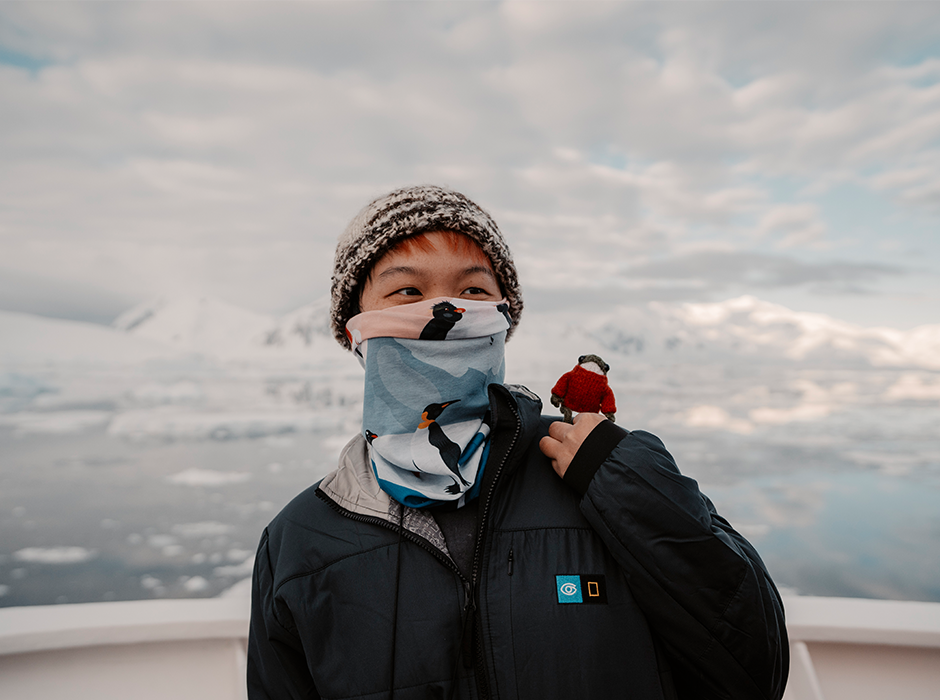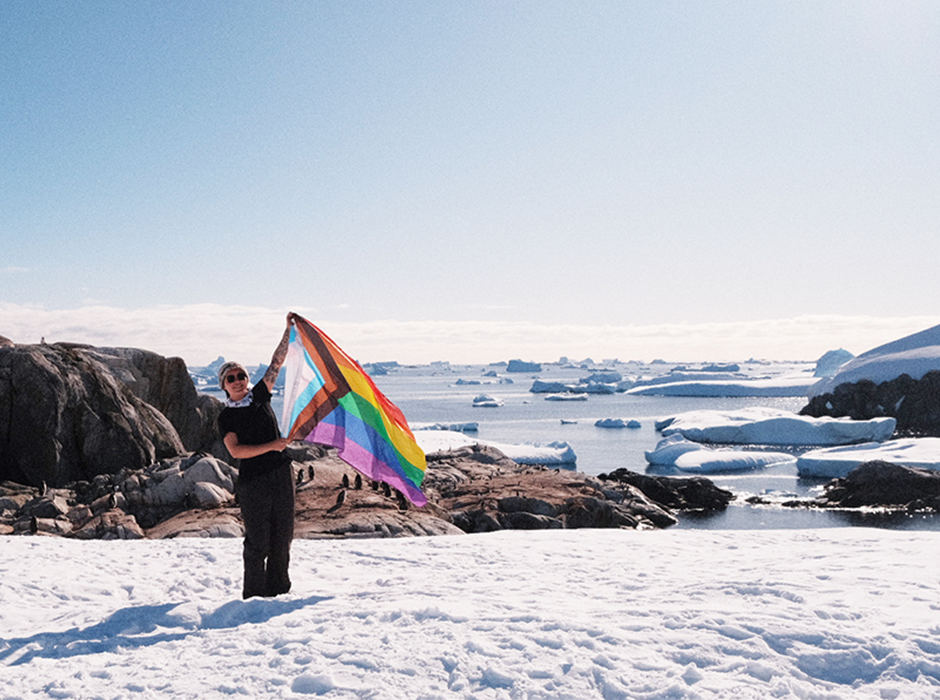
Marine Science doctorate candidate Pluto Liu on a recent trip to the Antarctic as a visiting scientist.
Marine Science doctorate student Pluto Liu recently joined the National Geographic Explorer ship to the Antarctic Peninsula and Patagonia as a visiting scientist.
Now in her eighth year of study and final year of a doctorate, Pluto came to Otago as an international student from China. She describes the three-week trip for LindBlad-National Geographic Expeditions as a “dream come true” due to her love of nature.
Visiting Antarctica also gave Pluto the opportunity to gather more information for her thesis, which explores the potential of Southern Ocean kelp populations establishing in Antarctica.
“A lot of the kelp samples I’ve analysed are with the help of our collaborators around the world,” Pluto says.
“The trip to Antarctica allowed me to look out for any kelp washed up on shore and take samples for genomic analysis to find out where they come from.”
Q&A
Guy Frederick (Sciences Communications Adviser) caught up with Pluto at the end of her voyage to the Antarctic to chat about life, studies in science and humanities, and advocacy for the LGBTQIA+ community.
What brought you to Otago eight years ago and what have you studied?
I was born in China and raised in an area of beautiful mountains and glaciers which formed my love for nature. New Zealand is known for its nature, and as I wanted to study animals, Otago was my first choice. For my Bachelor of Arts and Science I studied geography and zoology and then joined Professor Crid Fraser’s group for my ecology honours programme where I was introduced to her fascinating kelp research.
What are you researching for your doctorate?
I enjoy polar research and Crid had a great project available about kelp and Antarctica that I jumped at. My PhD research focuses on kelp (giant kelp and southern bull kelp) populations around the Southern Ocean and involves genomic analysis to analyse how they travel around the ocean – and if they could establish populations in Antarctica in the future under climate change. It’s involved a lot of everything – field work to collect samples, lab work to construct genomic libraries, and computer work for genomic analysis. The research is co-supervised by Dr Alana Alexander from Anatomy and both Crid and Alana are inspiring and amazing women scientists who I’m learning a lot from.
How was your recent trip to the Antarctic as a visiting scientist?
I applied for the opportunity to be a visiting scientist for National Geographic-Lindblad Expeditions on their Antarctic Peninsula and Patagonia voyage. Between doing science communications including presentations during the voyage, I could also collect further fine-scaled knowledge of kelp populations to help with the bigger questions of my research.
The trip was beyond amazing. Everything touched my soul – the sights, the smells, the sounds, the sunsets on the pink ice with dozens of humpback whales feeding around. Every single sense was triggered, refreshed and felt very alive.

Pluto took the opportunity during a stop on Petermann Island in the Antarctic Peninsula to advocate for the LGBTQIA+ community.
You are probably the first human to wave a flag on Petermann Island – what is the story behind that?
We had amazing weather throughout the trip, and the day we visited Petermann Island in the Antarctic Peninsula was no exception. There were thousands of gentoo penguins with lots of young playful teenagers that were finishing their moulting process. We climbed up a hill that had the most incredible panoramic view to take in the beauty of the penguins, sea and ice. I'm part of the LGBTQIA+ community for minority groups and I want to help advocate our voices for social equality and equity in academia. The fact I could be in the Antarctic for science and be advocating for my communities at the same time was an opportunity I didn’t take for granted.
What are you considering at the end of your doctorate?
I’m very open to what happens next but I'm considering academia as I want to continue to advocate for what I believe. Modern science is very westernised and in many ways is isolated from our interconnected lives with nature. Humanities and arts are equally important as science, and students should be educated in both areas as everything is connected and works as a whole. My undergraduate degree in arts and science really helped me to have different perspectives when thinking about challenges and opportunities.
How do you think your seven years at Otago have impacted you as an individual?
It’s always hard to start somewhere new without knowing anyone or anything. But through the years I’ve met great people doing great things in the University and the wider Ōtepoti community who have inspired me to grow myself over the years. I’ve become way more comfortable and confident in being myself and have clearer views about my values and beliefs. I really appreciate every person who I have met during my time at Otago.
I’ve also made the most of opportunities during my time here and felt fortunate to visit the wild and pristine sub-Antarctic islands as a visiting scientist on a 2023 BLAKE Expedition. I also attended the SCAR (Scientific Committee on Antarctic Research) in Chile last year and stayed at our collaborator's lab for an extra month to do some physiological experiments on kelp.